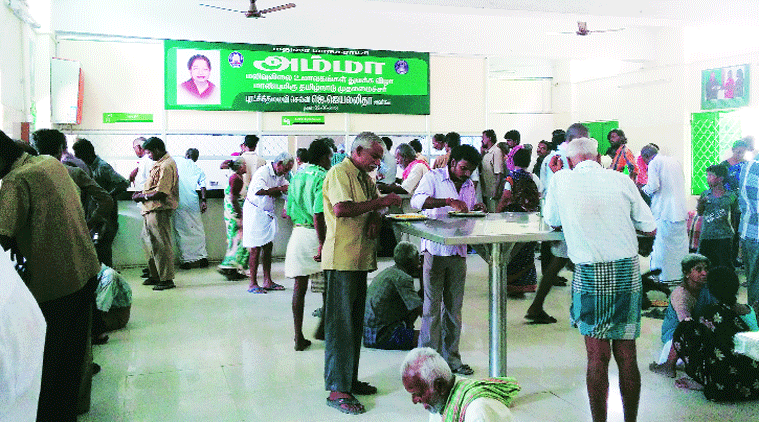Stay updated with the latest - Click here to follow us on Instagram
The Amma Bountiful
Plans are already afoot to set up Amma Cinemas to indulge Tamil Nadu’s immutable culture of films at Rs 25 a ticket.
 At an Amma Canteen in Madurai. “Amma hand feeds us,” says a mini-bus driver.
At an Amma Canteen in Madurai. “Amma hand feeds us,” says a mini-bus driver.
After canteens, water, drug stores, cinemas, supermarkets, seeds and baby care, Brand Amma comes to cement. From roti, kapda to makaan, how troubled TN CM has been building her aura.
A Gilt-edged portrait of Chief Minister J Jayalalithaa looms like a benign ghost over the newest pharmacy in K K Nagar, an upscale neighbourhood in the city of Madurai. There are three other medical stores in the vicinity, but 52-year-old L Muthu, an asthmatic carpenter who is in town to consult a specialist, makes a beeline for the ‘Amma Pharmacy’, one of 10 state-subsidised stores launched in June.
On the 80-km bus journey from Paramakudi in Ramanathapuram district, Muthu couldn’t shake off the thought of Amma’s ubiquity in urban Tamil Nadu. “I am still full from the three idlis I ate for Rs 3 at the Amma Unavagam in Melavasal,” he says. “And if thirst should strike, I will reach for Amma Kudineer.” It has been a pilgrimage of sorts, Muthu admits, as he pays Rs 1,025 for medicines after a 15 per cent discount.
After the success of the Amma Canteens, which are set to be replicated in the Capital and other states, Jayalalithaa had over the past year and a half set off on a roller coaster of welfare measures channelling her aura. Her eponymous brand, born of an astute understanding of the aspirations of the state, has found its foothold in indispensables like salt, water, medicines, seeds and groceries.
And now, after roti, paani and even kapda, comes makaan. Amma Cement, launched on September 26 — a day before Jayalalithaa was convicted in a disproportionate assets case — is meant for those constructing homes and affected by the recent 20-25 per cent hike in cement prices in the state. A 50-kg bag of Amma Cement will cost Rs 190, against the market price of Rs 320 a bag. Those renovating or repairing their house can get 10-100 bags of subsidised cement.
Plans are already afoot to set up Amma Cinemas to indulge Tamil Nadu’s immutable culture of films at Rs 25 a ticket. Urban households await the launch of 300 Amma Amudham supermarkets that will sell subsidised branded provisions, while farmers hope to reap the benefits of Amma Seed Agency and an Amma empowerment programme for farm women. Newborn children too are covered, with plans for free baby care kits, including sanitiser and toys.
It has been a full year since Amma bottled water was launched on September 15, 2013, the birth anniversary of former chief minister C N Annadurai. Priced at Rs 10 a litre, it is a disruptive product in a market dominated by global beverage majors. Processed at a large plant in Gummudipoondi, Thiruvallur district, it is sold exclusively at bus depots across the state and is in high demand. “Since the water is priced at half the market price, we were clear it should bear Amma’s name. She is the reason Tamil Nadu is a welfare state today,” says a Tamil Nadu State Transport Corporation official involved in the effort.
At the Amma Unavagam in Arappalayam, Madurai, as the clock strikes 12, the throng of men and women lined up outside grows impatient. Emerging from the kitchen, into the cool and slick serving hall lined with tiles, Devi Sathya and her six cooks hurriedly pull on maroon aprons and plastic gloves. Two giant casseroles are hauled up to the granite countertop, steel plates stacked tall, and a pail filled with drinking water before the doors are thrown open to the customers brandishing 10-rupee notes.
As Amma smiles down from her pictures on the walls, steaming plates of sambar rice are lapped up for Rs 5 each and curd rice with pickle for just Rs 3. “We go through 32 kg of vegetables and 60 kg of rice to serve 600 plates for lunch every day,” says Sathya, 37, the supervising cook who earns Rs 250 a day, supplementing her husband’s income from painting signboards. “By 1.30 pm, all the food is sold out.”
For a generation of daily-wage labourers, BPL families and homeless weaned on the thin gruel of political rhetoric, this sumptuous food is enough to cement their loyalties to Amma. Between 2.5 and 3 lakh people eat every day at the total 294 Amma canteens dotting Tamil Nadu’s urban centres. “No one who has eaten at one of the unavagams will ever forget what Amma has done for them. People like me couldn’t afford tasty, hygienic food,” says R Kumaravel, 43, a municipality sweeper.
What started as an experiment with 15 outlets in Chennai in February 2013 now looks set to add 360 more eateries. This is no longer a dabble in the shallows of populism, says S Rajendran, a professor of economics at Periyar University, Salem, who has written an academic paper on the canteens. “While the sustainability of these subsidies is debatable, they could emerge as an alternative to the PDS system where poor quality and leakages are rampant,” he says.
“Who needs subsidised rice when Amma’s hand feeds us?” agrees Sathish Kumar, a 24-year-old mini-bus driver in Madurai. With prices shooting through the roof, eating here works out much cheaper, says Kavitha, his wife, who is in her final year of college. “We save at least Rs 1,000 a month.”
But some of the schemes are little more than clever exercises in re-branding old wine. In a desolate aisle of the Pandian Cooperative Store on Madurai’s East Veli Street, K Kanakaraj, a retired bank employee, weighs the merits of Amma Salt, which comes in three fortified variants priced between Rs 10 and Rs 21, against the cheaper Arasu Uppu (government salt), a longtime product of the Tamil Nadu Salt Corporation. At just Rs 3.50 a kg for rock salt and Rs 6 for fine-grained salt, sacks of TNSC’s products fly off the shelves, while Amma Salt is yet slow-moving, says a store clerk. “But it is too early to tell,” he says.
The Pandian Cooperative Society, which has 23 grocery stores and several pharmacies across the district, is also an essential cog in Brand Amma’s factory of dreams. The society supplies rice and dal worth Rs 12 lakh and cooking gas worth Rs 5 lakh to the 11 unavagams in Madurai every month. Pandian’s stores have, for decades, offered the same discounts as Amma’s new ventures.
“It is all in the name,” says S Arul Das, assistant to the chairman of the society. “With Amma’s blessings, sales are bound to shoot up,” he says. “We offer a 10-15 per cent discount on medicines, just like the Amma Pharmacy. We even make home deliveries. Hopefully, the government’s new initiatives will send a wave of awareness and help customers discover cooperatives,” Das adds.
Great things are expected of Amma, and of the stores that bear her name, says S Saravanan, president of the Madura Coats Workers Cooperative Stores, which was chosen to set up the Amma Pharmacy in K K Nagar. “People expect higher discounts. We started offering 15 per cent but now we are talking to the government about the possibility of slashing prices by 25 per cent,” he says.
The Amma Pharmacy in Madurai goes through inventory of about Rs 20,000 a day. “We have put out ads in newspapers and on cable TV and we are adding to our drug list every day,” Saravanan says. “This is just a trailer. The film is yet to begin,” says another member of the cooperative’s Board of Directors.
Every now and then, whispers of Amma mining the populist vein in ever-new ways — green grocery, detergents, and even sugar — cause a flurry of excitement. “The brand is clearly built on emotional as well as monetary value. It may have begun in an unorganised fashion, but once the government realised the value it was building, it has focused on essential products and services that directly impact the poor,” says Smitha T, a market researcher from Coimbatore who is studying the rise of Brand Amma.
“What about the impact on small entrepreneurs and restaurants?” asks K Kottathai, 55, who runs A K Jeyam Hotel, a small eatery in Melavasal, Madurai. “I charge Rs 4 for an idli and make no profit on it. And I have to pay a rent of Rs 35,000 a month. So many pushcarts and small-time restaurants have gone out of business ever since Amma started interfering in our business,” she says.
Earlier this year, the Tamil Nadu Tea Plantation Corporation was reported to be rebranding TANTEA as Amma Tea, but a top official at the department denies it. “We are only undertaking a modernising exercise,” he says.
Amma Tea would also be welcome, says D Pandiammal, a Madurai Corporation councillor. “There are complaints that the tea powder supplied under PDS is bitter. If quality tea can be made available at an affordable price under Amma’s name, it would be the perfect solution to a genuine problem,” she says.
Brand Amma is emerging as the mother of all welfare schemes, offering a ready refuge from inflationary anxieties and serving to affirm Jayalalithaa’s stature as an epic hero — a little vain and flawed but, in the end, larger-than-life.







